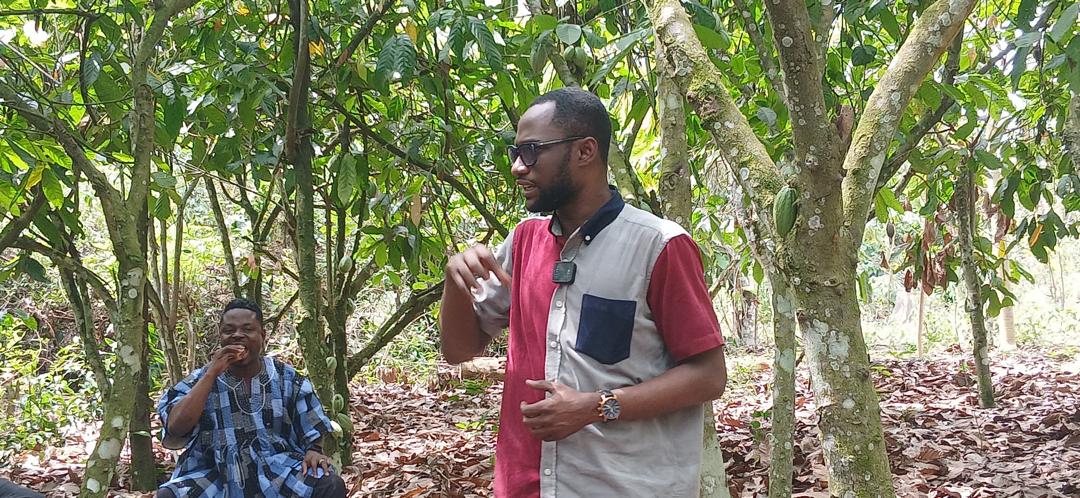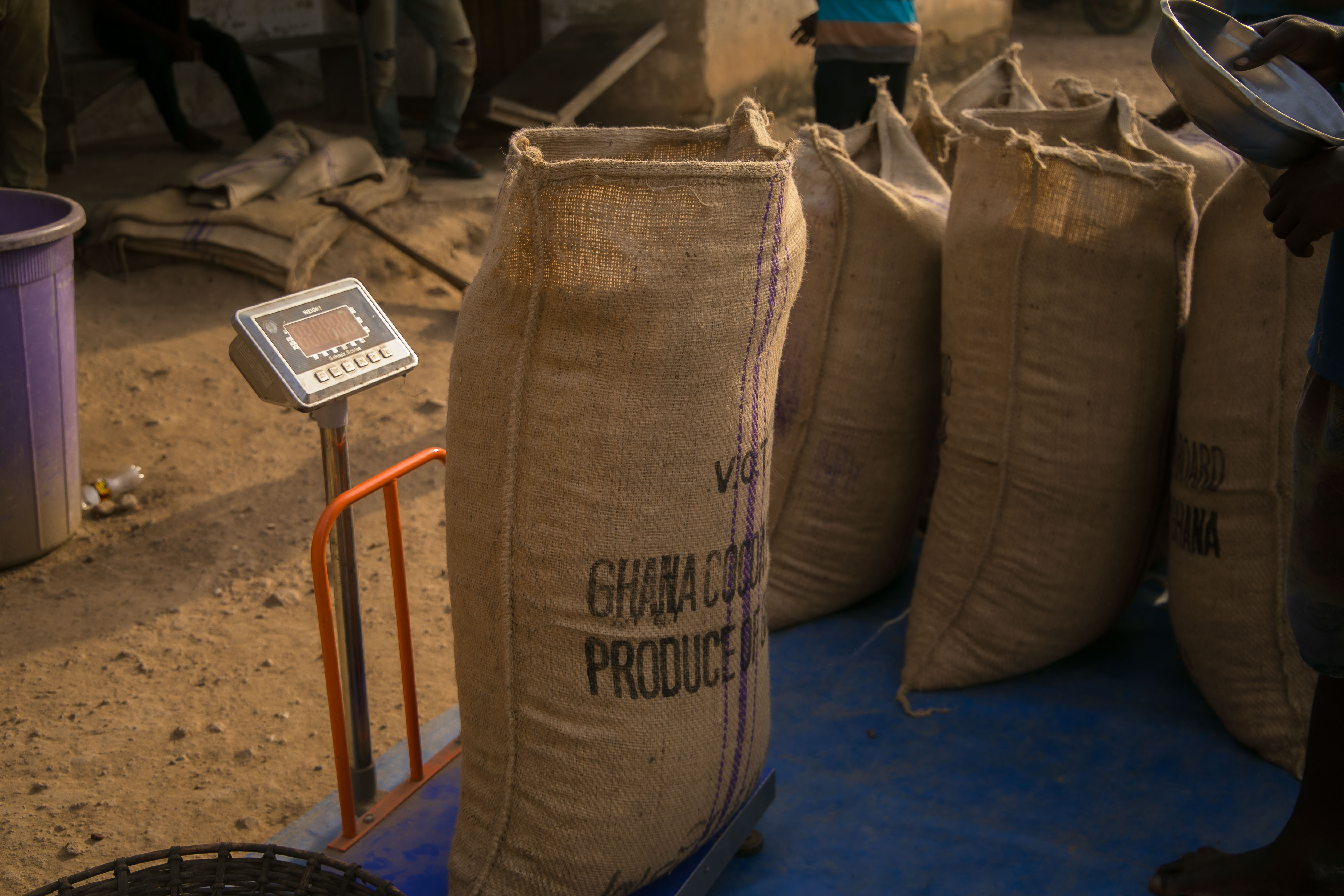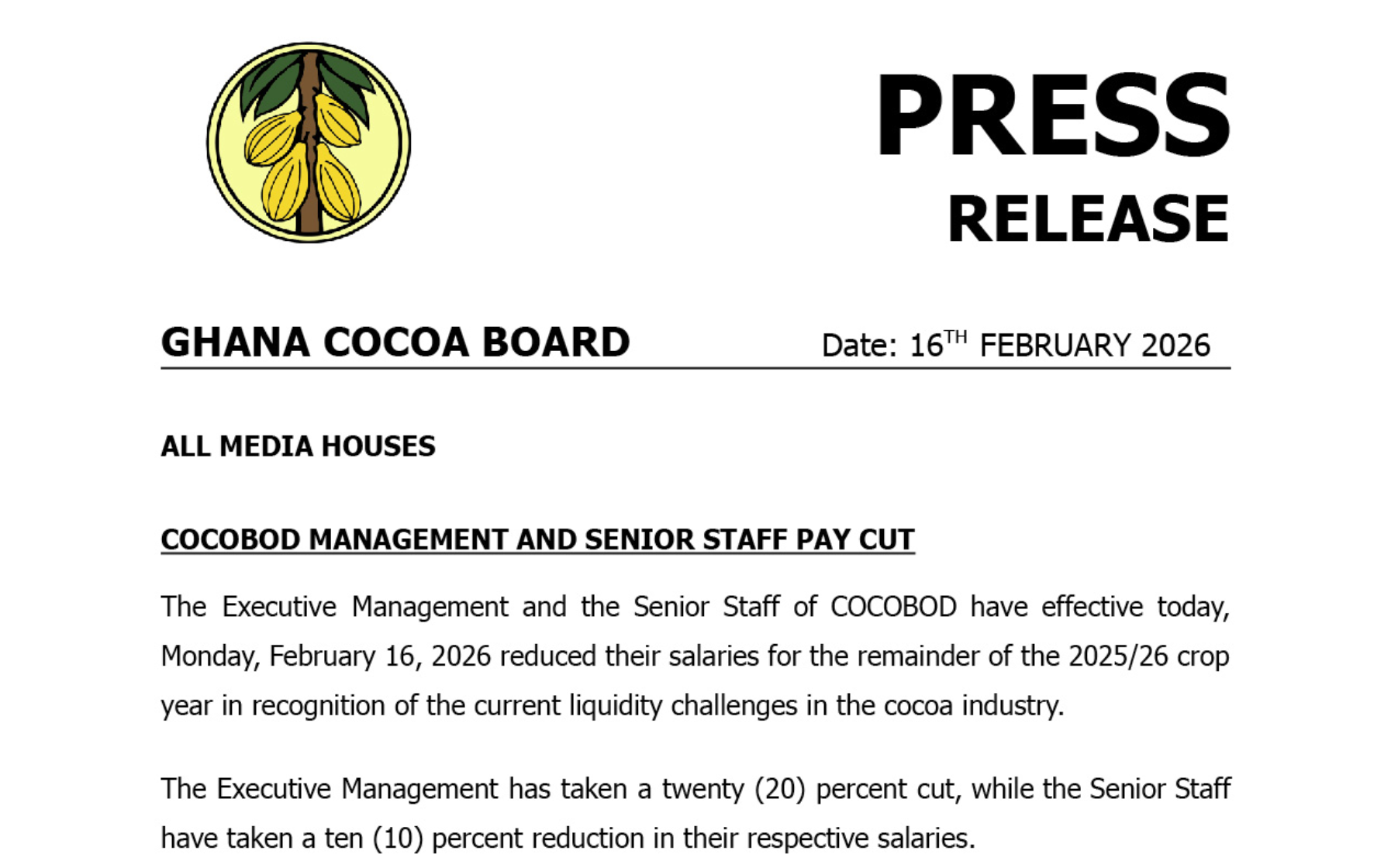SEVEN JOURNEYS, ONE MISSION: COCOA FARMERS REFLECT ON THEIR COLOMBIAN EXPERIENCE
Date: 10th October 2025
By Edward Kojo Asante
Assist. Public Affairs Officer
A delegation of seven Ghanaian female cocoa farmers recently participated in an exchange programme in Colombia, jointly sponsored by the Governments of Ghana and Colombia.
The initiative, which forms part of ongoing knowledge-sharing efforts between the two countries, followed an earlier visit by Colombian female cocoa farmers to Ghana this year.
While in Colombia, the Ghanaian farmers were introduced to modern agronomic practices, innovative cocoa processing methods, and cooperative management strategies designed to enhance productivity and promote sustainability in cocoa farming.
In the ensuing paragraphs, our esteemed cocoa farmers will share with COCOBOD News the valuable insights they gained from this transformative experience:
1. My name is Madam Rebecca Tetteh, a 38-year-old cocoa farmer from Asankragua in the Wassa Amenfi West Municipality. My family owns 118-acre cocoa farms, of which 110 acres are under mature cocoa trees, while the remaining 8 acres are reserved for young cocoa trees.
During my visit to Colombia, I observed how actively the youth participate in cocoa farming right from land preparation to harvesting. I was particularly inspired by their philosophy that “cocoa is love”, which highlights the passion and dedication needed to cultivate cocoa successfully.
I also learned that in Colombia, cocoa farming is embraced as a family enterprise, often passed down through generations, with teamwork among family members ensuring good harvests each season.
I am committed to sharing the knowledge and experiences I gained through this exchange programme with my family, with the hope of improving our annual yields. Thank you.
2. My name is Madam Dorcas Affum, a cocoa farmer from Paradise in Sefwi-Wiawso in the Western North region. Through COCOBOD initiative, I was privileged to be selected as part of the delegation that travelled to Colombia to learn and share knowledge on cocoa farming.
In my community, many farmers often dislike the idea of extension officers visiting our farms. We usually rely on traditional methods passed down from our forefathers, sometimes neglecting recommended agronomic practices.
In Colombia, however, I observed a different approach. Extension officers work hand-in-hand with farmers, making regular visits to their farms and providing continuous education on good agronomic practices. This close collaboration not only improves yields but also makes farming easier and more efficient.
I am determined to share the lessons I gained with my fellow farmers in Paradise. I will implement these practices on my farm and educate others on the importance of working with extension officers. I also plan to bring together female cocoa farmers in my community to learn better methods of cultivation and improved practices that enhance yields, as I witnessed in Colombia.
When the time comes for harvesting, I will gladly invite COCOBOD to see how I have applied the knowledge acquired through this invaluable exchange programme. Thank you.
3. My name is Madam Oforiwa Alice, a 62-year-old farmer from Bomopata, popularly known as Adansi, in the Ashanti Region of Ghana. I cultivate a 12-acre cocoa farm, but my passion goes beyond farming, I am deeply committed to uniting women to find better ways of improving livelihoods for our families and communities.
During my visit to Colombia, I was struck by the significant use of modern, women- and child-friendly machinery. With specialized equipment available for almost every stage of farming, their work was far less physically demanding than ours in Ghana. This clearly showed me how investing in technology can ease human labour and improve efficiency.
I also learned about their sustainable practices, including grafting techniques and reducing reliance on chemical herbicides and pesticides. Another eye-opening lesson was their use of irrigation. Though our climates differ, I realized that even small-scale irrigation systems could greatly reduce the challenges we face during the dry season.
I am determined to adopt these practices on my own farm and share this knowledge with fellow female cocoa farmers in my community, so that together we can improve our yields and livelihoods. Thank you.
4. My name is Madam Ernestina Osei Tutu, a 55-year-old farmer with a lifelong devotion to agriculture, particularly cocoa. My primary farm is a 12-acre cocoa plantation in Tinkong, Eastern Region, but I also manage about 180 acres of family farms in the Ashanti Region evidence of my deep commitment to farming.
Beyond my work on the land, I am passionate about women’s advocacy. I currently serve as the National Chairperson of the Ghana Association of Female Agricultural and Fish Farmers Award Winners (GAFAFAW), and in 2024, I was honoured as the National Best Female Farmer.
During my exchange programme in Colombia, I was inspired by the strong emphasis on sustainability and legacy building, where farmers ensure future generations benefit from their work. I was particularly impressed by the culture of consuming what they produce, which promotes healthier lifestyles and better living conditions.
Their farms operate as true family businesses, with each member taking responsibility for different aspects such as cultivation, processing, or agrotourism. One powerful lesson I took away is the central role of women.
In many farming communities, women lead and set the pace, with men following in support. This reinforced the vital truth that women are not just vulnerable, but strong, capable, and central to progress.
I am committed to applying these lessons in Ghana especially in advancing sustainability, promoting family-based farming, and exploring innovative cocoa processing. I look forward to collaborating with partners who share this vision.
5. My name is Madam Margaret Agyeiwaa, popularly known as Aunty Maggie. During my short stay in Colombia with fellow female cocoa farmers, I gained valuable lessons. One of the most striking ones was that nothing goes to waste, every by-product is reused to generate income. Farmers also avoid chemicals because they consume what they grow, ensuring healthier lives and sustainable practices.
I strongly believe that change is needed for Ghanaian women, many of whom continue to live in poverty. We must move beyond cultivating cocoa alone and begin processing it ourselves. If every region had access to a processing machine, women could produce cocoa powder and chocolate, create year-round income streams and improve the living conditions of female cocoa farmers nationwide.
I am determined to bring the women in my village together and educate them on the importance of venturing into handmade chocolate production. Through our cooperatives, we can take this bold step not only to support our households but also to create a brighter future for our families and communities.
6. My name is Madam Leticia Yankey. I cultivate a 37-acre cocoa farm and a 13-acre rubber plantation. Beyond farming, I am a strong advocate for women’s empowerment in agricultural value chains. I also serve as the founder and president of the Women in Cocoa Cooperative, which brings together about 30 female cocoa farm owners.
I was privileged to join my fellow female cocoa farmers on a knowledge exchange visit to Colombia to experience the diversity of cocoa farming. Over six days, I observed that in Colombia, cocoa is traded under a free market system, with prices fluctuating according to the international market.
In contrast, Ghana operates a fixed farm-gate price system which, regardless of global price changes, ensures stability and protection for farmers. For this, I commend the Government of Ghana and COCOBOD for always safeguarding the interests of Ghanaian cocoa farmers.
Another important lesson was their land tenure system, where farms are largely family-owned and managed across generations. I believe Ghana must re-examine our land tenure arrangements and place greater value on cocoa trees, so people understand the long-term consequences of destroying them.
I am committed to training the women in my cooperative and sharing the knowledge I gained so that together, we can contribute to sustaining the cocoa sector and securing its future for generations to come.
7. My name is Madam Fatima Adam, a 50-year-old cocoa farmer from the Western Region of Ghana. My farm is located at Aprompi in the Sefwi Boako District, where I cultivate 40 acres of cocoa. On average, I harvest about 30 bags of cocoa each year, though the yield varies depending on the season.
My visit to Colombia was truly eye-opening. In Ghana, we lack the infrastructure and technology to process our cocoa, so we sell the raw beans to the government. In contrast, female cocoa farmers in Colombia go a step further by using small machines to process cocoa into chocolates, jewelry, and other value-added products, which provide them with additional income during the off-season.
I also noticed many similarities between our farming systems, such as pruning, pollination, and reliance on smallholder farmers. However, Colombian farmers have better access to resources, which enables them to manage their farms more efficiently and increase productivity.
I am committed to adopting the techniques I observed and complementing them with the support we already receive from COCOBOD extension services. I will also share this knowledge with my fellow farmers and encourage innovative cocoa processing, just as I saw in Colombia, to help female cocoa farmers in my community earn additional income. Thank you.
Conclusion
The reflections of these seven remarkable women underscore the power of cross-cultural exchange in transforming perspectives and practices within the cocoa sector. Their experiences in Colombia revealed not only innovative farming techniques and sustainable processing methods but also the central role of family, women, and community in shaping a resilient cocoa economy. From improved agronomic practices to value addition and cooperative empowerment, the lessons learned point to practical pathways for strengthening Ghana’s cocoa industry.
Ultimately, this journey was about planting seeds of change that can grow into a more sustainable, inclusive, and prosperous future for Ghana’s cocoa farmers. With continued support, collaboration, and determination, these women and their communities stand ready to transform their insights into lasting impact for generations to come.
Other News / Articles you might be interested in.

COCOBOD INTENSIFIES NATIONWIDE ENGAGEMENTS ON PRODUCER PRICE REVIEW AND SECTOR REFORMS
The Ghana Cocoa Board (COCOBOD) has intensified stakeholder engagements across cocoa-growing regions following ...
Read More
COCOBOD RELEASES GH¢3.62 BILLION TO LBCS
Ghana Cocoa Board (COCOBOD) has released a total of GH¢3.62 billion to ...
Read More
COCOBOD MANAGEMENT AND SENIOR STAFF PAY CUT
The Executive Management and the Senior Staff of COCOBOD have, effective today, Monday, ...
Read More